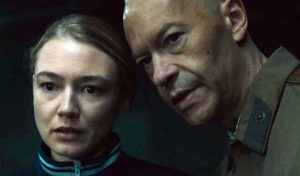As is traditional in one of the more intriguing sub-genres of speculative fiction, the most dangerous monsters of SPUTNIK turn out to be the ones that didn’t come from outer space. That is the only standard trope to be found in this lean and lyric film from Russia, though, as it takes a sober look at human nature through the prism of noble intentions tainted by a corrupt society.
Set in 1983, it begins as two cosmonauts are returning to Earth from an unspecified mission. The commander, charismatic national hero Konstatin (Pyotr Fyodorov) is singing a song about roses and joking to his co-pilot that they might have to report him as being mentally disturbed. It’s a joke, but as with so much in the film, there are layers of meaning and foreshadowing all nested like the matryoshka doll that, along with the color red, will feature prominently in the story.

Oksana Akinshina, Fedor Bondarchuk
As the cosmonauts sing and banter about the hot baths to which they are looking forward, something appears outside the craft. We barely see it, and the people on the ground in Kazakhstan who are recovering the dead co-pilot and the injured commander know nothing about it. Neither do we until a mysterious Colonel (Fedor Bondarchuk) shows up in Moscow to observe a medical hearing, and subsequently to offer a job to Tatyana (Oksana Akinshina), a psychologist who, like the Colonel, is more concerned with results than protocol. That concern led to an embrace of unorthodox methods (she nearly drowned a patient) have her up on criminal charges, the current hearing, and dismissal from her job with criminal charges to follow. The colonel likes the fact that the patient was cured thanks to the treatment. He likes Tatyana even more when she coolly appraises the merits of job he offers her, along with a promise to fix the outcome of the hearing, rather than leaping to accept it. It takes his admission that she’s the only one who can succeed that finally convinces her.

Pyotr Fyodorov, Akinshina
The patient, is of course, Konstantin, who has recovered from his injuries in record time, and is resentful about the endless psychiatric evaluations and fruitless attempts to hypnotize him into remembering what happened during the final moments of the flight, when the recording equipment failed. Tatyana impassively watches as Yan (Anton Vasilev), the current lead investigator is toyed with by Konstantin. In ten minutes, she justifies the Colonel’s instincts when she takes less than ten minutes to accurately diagnose Konstantin’s PTSD using hot tea and exactly the right questions.
That there is an extra-terrestrial involved is no surprise, but its manifestation and methods are disturbingly original. As one scientist describes the situation, the alien wears Konstantin like a space suit, reducing the pinnacle of the terrestrial food chain to outerwear, Even more disquieting is the mystery of why exactly the creature is here. SPUTNIK uses that mystery to allow the characters to reveal their own true natures when interacting with it, during which Tatyana proves that her iconoclastic bent is the path to knowledge, and that the proposition that human life is sacred becomes muddled in the often competing relative moralities evinced by the other characters. In one of the film’s most disturbing moments, one scientist describes an atrocity committed under spotlights and recorded for posterity, finishing by adding, with pride, that it will lead to great scientific advancements.
Tatyana soon begins to realize that she is not being given the whole story. This being the Soviet era, truth as a commodity is as malleable a concept as the ci-mentioned morality, and personal motivations easily outflank professional obligations. Using Yan’s lust for a Nobel Prize as in incentive to spill what he knows, she discovers the hidden layers at work in the investigation, and slowly gains the trust (also a relative term at this time and place in history) of Konstantin, who is nursing his own secrets.
As a horror film, SPUTNIK is sublime. It keeps the audience off-kilter with a plot as tightly coiled as Tatyana’s no-nonsense bun. For the alien, it proffers a slimy cross between a praying mantis and a slug that moves quickly and with an unfathomable purpose. The camera creeps through corridors and inches around corners with a sinister propulsion. Secrets are revealed without hyperbole that makes them all the more shocking, abetted by the sense of dread provoked by a driving metal score as muted yet perturbing as the color scheme. The effects, while impressive, are secondary to a sound design aimed directly at our queasiness about the sound of a squish, or the off-screen action of something forcing its way down someone’s throat. Or the reactions from Tatyana herself, impeccably played by Akinshina as a steely woman with unapologetic intelligence and self-possessed resolve. Her violent physiological response to a killing we see only as an infra-red image has the effect of completely unnerving the viewer by forcing him or her to use imagination to fill in the gaps of what could induce such a violent reaction. This, after all, is he cinematic successor to ALIEN’s Ripley.
As a metaphor for the way human beings will accommodate themselves to a corrupt society, it is even more chilling. The characters fail to realize that they have so internalized this corruption, that betrayal of colleague or country fails to register as remarkable. Rather it is the norm in a culture the official story is a lie, and the truth, as in that unorthodox treatment that cures, is a felony.
SPUTNIK plays cat-and-mouse with us the way the characters play the same with each other. The result is a fever-dream or horror that can’t be safely pigeonholed in the realm of fantasy. This is an instant gut-wrenching and cerebral classic that is dark, twisted, and quietly mesmerizing as it builds to its devastating climax.
Your Thoughts?